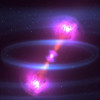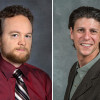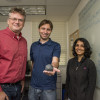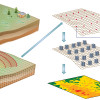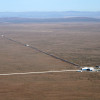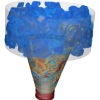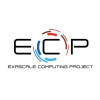News
Scientists Decode the Origin of Universe’s Heavy Elements in the Light from a Neutron Star Merger
Scientists have obtained the first measurement of the merger of two neutron stars and its explosive aftermath. Computer simulations at NERSC are critical for understanding the event, which could provide valuable insights into the origin of universe’s heavy elements. Read More »
ESnet’s Science DMZ Design Could Help Transfer, Protect Medical Research Data
As medicine becomes more data-intensive, a Medical Science DMZ design proposed by Berkeley Lab's Sean Peisert & Eli Dart could provide a secure solution for medical science data transfers. Read More »
Lab Supports Record-Breaking Grace Hopper Celebration
With 18,000 attendees, 700 speakers and a mind-boggling array of talks, workshops and networking activities to choose from, this year’s Grace Hopper Celebration of Women in Computing, held in Orlando, Florida Oct. 4 – 6, was the biggest yet. As in years past, Berkeley Lab and staff proudly supported the event, which showcases the achievements of women in computing and seeks to encourage and support women entering the field.NERSC Operations Technologies Group Leader Elizabeth… Read More »
International Team Reconstructs Nanoscale Virus Features from Correlations of Scattered X-rays
Berkeley Lab researchers contributed key algorithms which helped scientists achieve a goal first proposed more than 40 years ago – using angular correlations of X-ray snapshots from non-crystalline molecules to determine the 3D structure of important biological objects. Read More »
Assessing Regional Earthquake Risk and Hazards in the Age of Exascale
Researchers from Berkeley Lab, Lawrence Livermore Lab and UC Davis are building the first-ever end-to-end simulation code to precisely capture the geology and physics of regional earthquakes, and how the shaking impacts buildings. Read More »
How Berkeley Lab Software Led to the 2017 Nobel Prize in Physics
Behind the 2017 Nobel Prize in Physics was the work of two Berkeley Lab groups specializing in developing tools and applications for moving and managing data LIGO data and allowing scientists around the world to access and analyze the information. Read More »
Berkeley Lab-led ECP Co-Design Center Achieves Orders of Magnitude Speed-Up in Latest Software Release
Just one year after the U.S. Department of Energy's (DOE) Exascale Computing Program began funding projects to prepare scientific applications for exascale supercomputers, the Block-Structured Adaptive Mesh Refinement Co-Design Center has released a new version of its software that solves a benchmark problem hundreds of times faster than the original baseline.The Block-Structured Adaptive Mesh Refinement Co-Design Center is one of five ECP co-design centers, so named because they are structured… Read More »
Berkeley Lab Aims to Strengthen the Cybersecurity of the Grid
As part of the Department of Energy’s (DOE’s) commitment to building cyber-resilient energy delivery systems, a new project led by Lawrence Berkeley National Laboratory (Berkeley Lab) will develop tools to detect and counter certain types of cyber attacks on the grid. Read More »
Quantum Computation to Tackle Fundamental Science Problems
Two Berkeley Lab teams will receive DOE funding to develop near-term quantum computing platforms and tools to be used for scientific discovery in the chemical sciences. One team will develop novel algorithms, compiling techniques and scheduling tools, while the other team will design prototype four- and eight-qubit processors to compute these new algorithms. Read More »
IDEAS Goes Big: Fostering Better Software Development for Exascale
Scalability of scientific applications is a major focus of the Department of Energy’s Exascale Computing Project (ECP) and in that vein, a project known as IDEAS-ECP, or Interoperable Design of Extreme-scale Application Software, is also being scaled up to deliver insight on software development to the research community. One channel is a series of webinars on best practices for HPC software developers which began in June. IDEAS-ECP members will also present a half-day tutorial on Better… Read More »







 Instagram
Instagram YouTube
YouTube